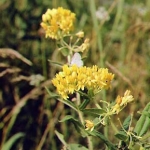| Common Name: |
Orange Milkweed |
| Other Names: |
Butterfly Weed, Canada Root, Pleurisy Root, Swallow-Wort, Tuber Root |
| Botanical Name: |
Asclepias tuberosa |
| Genus: |
Asclepias |
| Family: |
Asclepiadaceae |
| Native Location: |
Eastern and southern N America |
| Cultivation: |
Dry, sandy, neutral to acid soil in sun. May be attacked by cucumber mosaic virus. Asclepias tuberosa is sensitive to disturbance. |
| Propagation: |
By seed sown in spring; by root cuttings in autumn or spring; by basal cuttings in spring. |
| Harvest: |
Roots are lifted in autumn and used fresh in a syrup or dried for compresses, powders, decoctions, ointments, and tinctures. |
| Height: |
60-90cm (12-24in) |
| Width: |
23-45cm (9-18in) |
| Hardiness: |
Z4-9 |
| Parts Used: |
Roots |
| Chemical Constituents: |
Asclepiadin
Asclepione
Galitoxin
Volatile Oils
|
| Properties: |
A bitter, nutty-flavored tonic herb that increases perspiration, relieves spasms, and acts as an expectorant. |
| Known Effects: |
Decreases thickness and increases fluidity of mucus in lungs and bronchial tubes
Irritates mucous membranes
Stimulates and irritates gastrointestinal tract
|
| Possible Additional Effects: |
Potential mild laxative to cause, watery, explosive bowel movements
May increase perspiration
May help treat pleurisy
|
| Medicinal Uses: |
Internally for pleurisy, bronchitis, pneumonia, asthma, dry cough, gastritis, eruptive fevers, rheumatic fever, feverish stages of colds and influenza, and uterine disorders. Excess causes diarrhea and vomiting. Not given to pregnant women. Externally for, bruises, wounds, ulcers, and rheumatism.
To treat cough, pleurisy, pain, rheumatism, and difficulty in breathing. |
| Possible Side Effects: |
Pleurisy root's side effects include gastrointestinal irritation, nausea and vomiting. Pleurisy root contains cardiac glycosides, which can help control irregular heartbeat, reduce the backup of blood and fluid in the body, and increase blood flow through the kidneys, helping to excrete sodium and relieve swelling in body tissues. However, a buildup of cardiac glycosides can occur, especially when the herb is combined with certain medications or other herbs that contain cardiac glycosides, causing arrhythmia, abnormally slow heartbeat, heart failure, and even death |
| Warnings and Precautions: |
Don't take if you:
Are pregnant, think you may be pregnant, or plan pregnancy in the near future
Have any chronic disease of the gastrointestinal tract, such as stomach or duodenal ulcers, reflux esophagitis, ulcerative colitis, spastic colitis, diverticulosis, or diverticulitis
Consult your doctor if you:
Take this herb for any medical problem that doesn't improve in 2 weeks (There may be safer, more effective treatments.)
Take any medicinal drugs or herbs including aspirin, laxatives, cold and cough remedies, antacids, vitamins, minerals, amino acids, supplements, other prescription or non-prescription drugs
Pregnancy:
Dangers outweigh any possible benefits. Don't use.
Breastfeeding:
Dangers outweigh any possible benefits. Don't use.
Infants and Children:
Treating infants and children under 2 with any herbal preparation is hazardous.
Others:
Dangers outweigh any possible benefits. Don't use.
Storage:
Store in cool, dry area away from direct light, but don't freeze.
Store safely out of reach of children.
Don't store in bathroom medicine cabinet. Heat and moisture may change the action of the herb.
Safe Dosage:
Consult your doctor for the appropriate dose for your condition.
|
| Drug Interactions: |
Acebutolol
Common Name: Sectral
Combination Drug: Secradex
Purpose: Acebutolol is used to treat high blood pressure and certain forms of heart arythmia, and is in a family of drugs known as beta-andregenic blockers.
Instruction: Adverse reactions may occur. Consult with physician or pharmacist before using this herb. |
| Taking pleurisy root with this drug may be harmful: |
| Digitalis, (Digitek, Lanoxin)—may increase the risk of cardiac glycoside toxicity |
|
| Disease Effects: |
May worsen heart disease. |
| Supplement Interactions: |
Increased risk of cardiac glycoside toxicity when used with other herbs that contain cardiac glycosides, such as Black Hellebore, Calotropis, Motherwort, and others. |
| Adverse Reactions, Side Effects or Overdose Symptoms: |
| Signs and Symptoms |
What to Do |
|
| Appetite loss |
Discontinue. Call doctor when convenient. |
| Coma |
Seek emergency treatment |
| Diarrhea |
Discontinue. Call doctor immediately. |
| Lethargy |
Discontinue. Call doctor when convenient. |
| Muscle weakness |
Discontinue. Call doctor immediately. |
| Nausea or vomiting |
Discontinue. Call doctor immediately. |
|
| Bibliography: |
Encyclopedia of Herbs by Deni Brown Copyright © 1995, 2001 Dorling Kindersley Limited Pg 134
A-Z Guide to Drug-Herb-Viatimn interaction by Alan R. Gaby, M.D. copyright © 2006 Healthnotes Inc. pg. 3
The Essential Herb-Drug-Vitamin Interaction Guide by Geo. T. Grossberg,MD and Barry Fox,PhD Copyright©2007 Barry Fox,PhD. pg. 370
Vitamins, Herbs, Minerals & Supplements The Complete Guide by H. Winter Griffith, MD Copyright©1998 Fisher Books pp. 415-416 |

